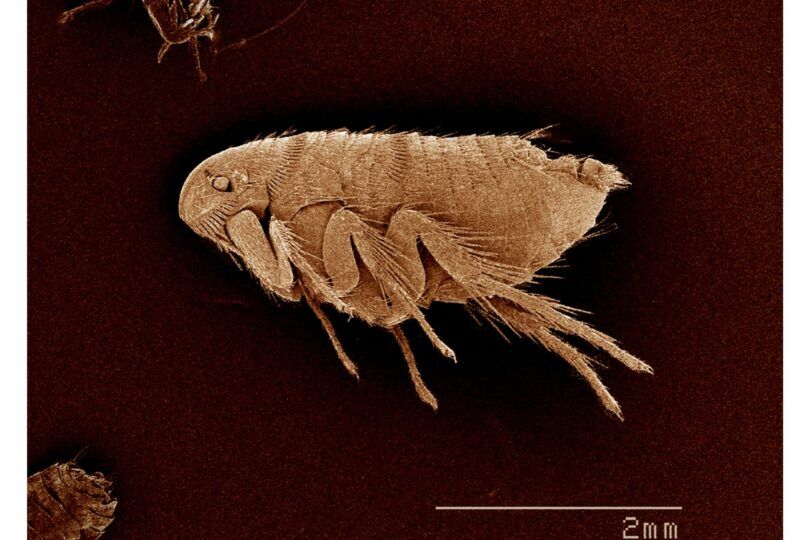Keep Your Horse Flea-Free
You often hear of cats and dogs getting fleas, but what about horses? Horses are also a mammal covered in fur, both criteria for fleas, but you don’t often hear about horses actually having them. While theoretically horses can get fleas, they do not make the best host for this insect.
Fleas are wingless, parasitic insects that can infest a variety of animal species. They are found all over the United States, however they prefer warm and humid habitats to spawn. While they can infest horses, it is quite rare. To get rid of fleas, treat affected animals with flea shampoo. Fleas can be prevented by using appropriate insect repellent. If you think your horse has fleas, a vet should be consulted to ensure that you are using the best treatment for your horse.
Fleas: What are they?
Fleas are an invasive insect that typically infests both mammals and birds. They are tiny, flightless insects that are dark in color and can jump up to 13 inches. (Yep, YUCK.)
The Life Cycle of a Flea
Fleas are very tiny and hard to see. Because of this, you likely wouldn’t know that your animal has one until there is an infestation. Adult fleas lay tiny eggs that hatch into larva.
When they mature, they are able to crawl away and hide in dark places where they spin a cocoon to become what you would recognize as a flea.
They often stay in their cocoon for months until they have a sufficiently warm and humid environment to encourage them to emerge (MSU [Michigan State University] Pesticide Safety Education Program).
Where Fleas can be Found in the USA
Fleas can be found throughout the United States, however they particularly like warm and humid environments.
How do you treat an animal with fleas?
When an animal contracts fleas, it is important to wash them thoroughly using specific flea shampoo. Fine-tooth combs can be used to comb out the fleas once they have been killed. Keep in mind that fleas can also live on furniture and other household items. Pet beds, human bedding, and even carpets and rugs should be cleaned to ensure the infestation doesn’t come back.
Once infected, treating for fleas is important, but you should also try to figure out where they were contracted in the first place.
Fleas like warm and humid places such as dens and burrows. If your pet likes to hide out under your porch or in a doghouse, you may want to sanitize those areas as well.
Horses and Fleas
You’ve definitely heard of a cat or dog getting fleas, but you’ve likely never heard of a horse with fleas. This is because the fleas and horses don’t generally come into contact.
Can horses get fleas?
Theoretically, yes, a horse can get fleas. It is rare, however.
Photo Cred: Canva
Horses and Parasites
Horse owners often talk about internal parasites affecting their horses. People deworm their horses on a regular schedule, and treat for worms. However, horses can also be impacted by external parasites as well.
Can horses get lice?
Yes, horses can contract lice. If a horse is biting or itching at an area of their skin that does not make sense, this could be an indication that your horse has lice.
It should be noted, though, that lice are very tiny and may not be visible to you.
There are certain sprays and formulas that can target lice—however, it is recommended to consult a vet to determine the optimal treatment.
Can horses get ticks?
Yes, horses can get ticks. Ticks are very dangerous since they carry a number of diseases. If your horse is itching or balding at an abnormal spot, you should probably check for a tick.
If you find one, you may want to consult a vet before attempting to remove it.
If removed improperly, the head may stay embedded in their skin, which can cause infection and more problems. Consult your vet to determine a removal and treatment process due to the high risk of tick-borne diseases.
Photo Cred: Canva
Frequently Asked Questions
Q: How do you get rid of horse fleas?
A bath with flea shampoo can help kill the insects. With that said, if you have determined that your horse has fleas, you may want to bathe them a few times to ensure that all the fleas have been killed.
Q: How do you prevent horse fleas?
Regular pasture maintenance, deworming, baths, and insect repellent can help ensure that you never have to deal with horse fleas to begin with.
Q: Why do fleas avoid horses?
Fleas like warm and humid environments like dens and burrows. Horses don’t lay down too often, and when they do, they it’s generally not in a dark, humid space.
Parting Thoughts
A horse can contract fleas, but it is very unlikely. With that said, it is important to pay close attention to the signals that your horse is giving you. While they may not have fleas, you should always be vigilant to changes in behavior.
Regular baths, grooming, and insect repellent during summer months can help ensure your horse stays free of fleas, as well as other pests. Check over stalls and pastures for parasite-prone areas. Finally, if you think that your horse is suffering from a parasite, consulting a vet can help determine the proper treatment and avoid long term repercussions.
P.S. Enjoy this article? Trot on over to:
- Horse Hay FAQs: List of Types of Hay, What Hay is Best, etc.
- Food or Foe: What Do Horses Eat (And Why)
- How Horses Sleep: A-Zzz Guide to Equine Rest
- Daily Horse Care Made Simple (Quick-Print Checklist)
- Horse Lifespan 101 (Life Stages, Teeth, Senior Horse Care)
Sources
https://www.canr.msu.edu/ipm/uploads/files/Fleas.pdf
https://www.cdc.gov/fleas/avoid/index.html
